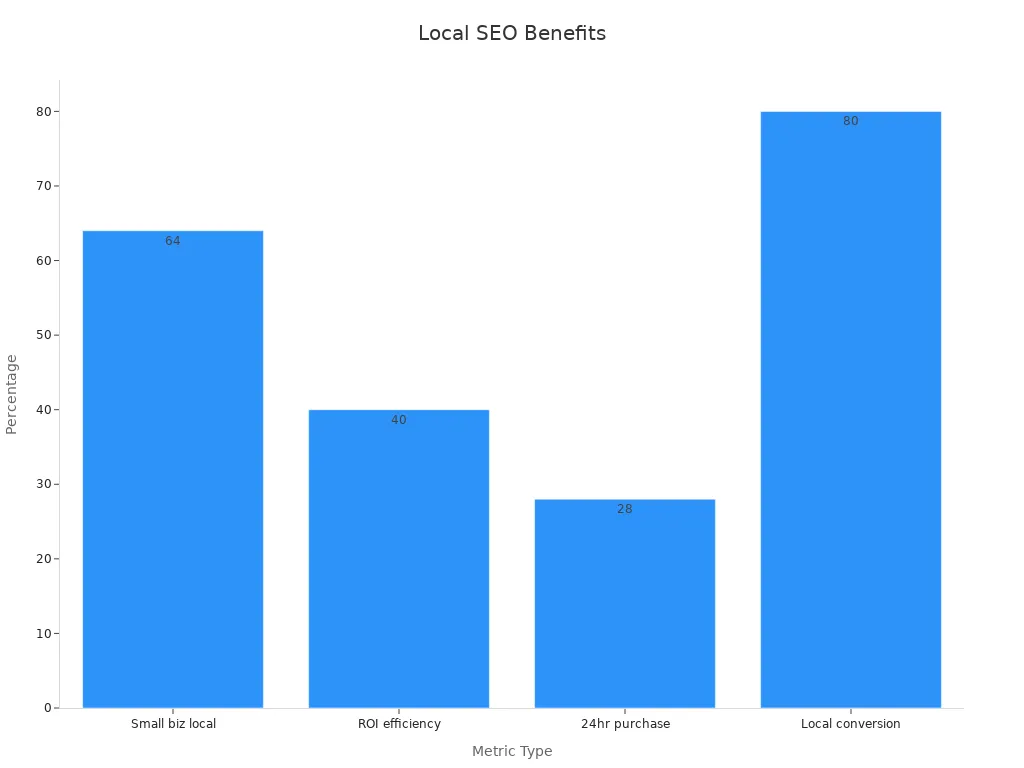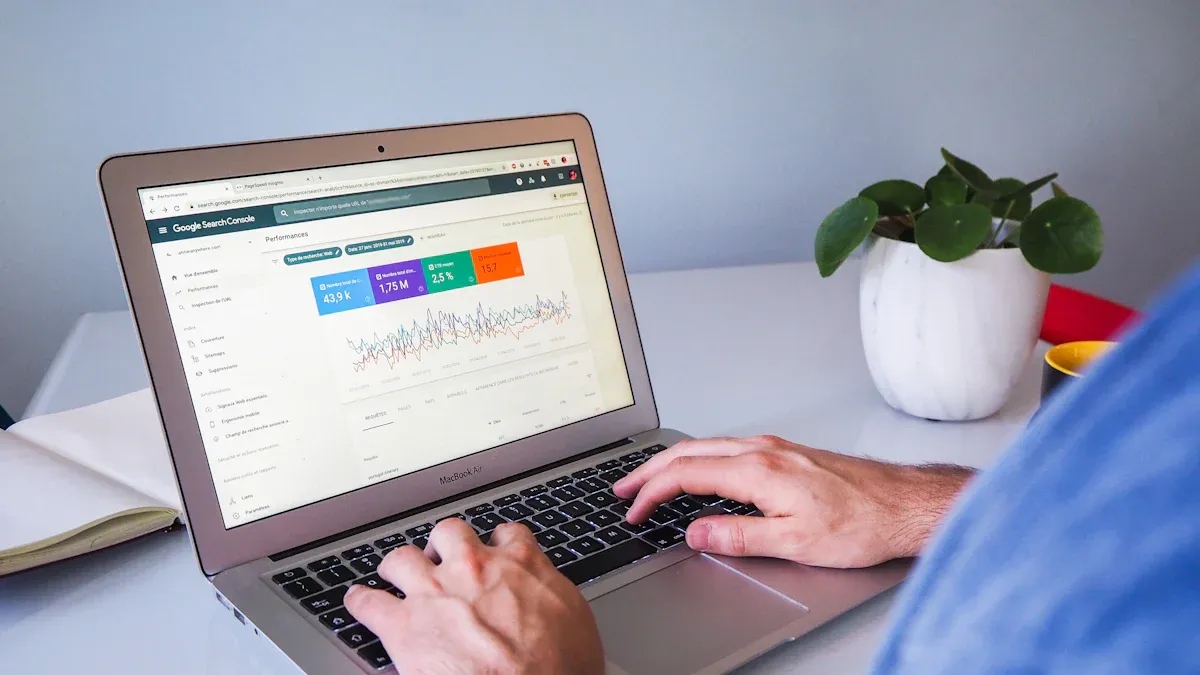Why Local SEO Matters for Small Businesses

Imagine this: you own a small business and want locals to notice. That’s where local SEO helps. It makes your business show up in local searches. About 96% of people use the internet to find nearby businesses. Local SEO makes sure your business stands out. It’s also affordable. A complete Google Business Profile gets seven times more clicks. This brings more customers to you.
Local SEO does more than make you visible—it builds trust. People trust businesses with clear and correct online details. They are more likely to visit or call you. Around 88% of smartphone users contact a local business within a day. By focusing on your area, you can compete with big companies. You’ll also grow a strong online presence and attract loyal customers.
Key Takeaways
Local SEO helps people nearby find your business easily.
A full Google Business Profile can get seven times more clicks. This brings more visitors to your store.
Good customer reviews build trust and can boost sales. About 80% of local searches lead to purchases.
Local SEO is cheaper and gives better results than old ads.
Keeping the same business info everywhere builds trust and improves rankings.
What Is Local SEO?
Definition and Purpose of Local SEO
Local SEO helps your business show up in searches nearby. It connects you with people in your community online. This means customers in your area can find you easily. For example, if someone searches "coffee shop near me," local SEO makes sure your business appears.
The goal of local SEO is simple: bring more people to your store, get more calls, and increase sales. It’s like shining a spotlight on your business for your neighborhood. Using tools like Google Business Profile and local keywords helps your business stand out in local searches.
Tip: Always keep your business details correct online. Clear information builds trust with customers and improves your search rankings.
Differences Between Local SEO and General SEO
Local SEO and general SEO both improve online visibility but work differently. Local SEO connects you with nearby customers, while general SEO targets a wider audience. Here’s a quick breakdown:
Local SEO:
Focuses on searches like "pizza near me."
Uses tools like Google Business Profile and reviews.
Aims to appear in the Local Pack (map section).
General SEO:
Ranks for broader keywords not tied to location.
Focuses on content, links, and technical SEO for bigger reach.
Competes for organic rankings on search results pages.
Key stats show the differences:
Local SEO gets 44% of clicks in Google’s Local Pack, while general SEO’s top result gets 39.8%.
78% of mobile local searches lead to a purchase within a day, compared to 2-5% for general SEO.
Searches with "near me" have grown by 500%, proving local search is rising fast.
By focusing on local SEO, you can attract customers nearby who are ready to buy.
Why Local SEO Is Essential for Small Businesses
Local SEO is a must for small businesses. Here’s why:
It Brings Quick Results:
Local SEO connects you with people searching for your services now. Did you know 28% of local searches lead to a purchase in 24 hours? That’s because local searchers often want to buy right away.It’s Affordable:
Local SEO gives great results without costing too much. For example, 40% of local SEO campaigns see a 500% or better return on investment. Just optimizing your Google Business Profile can make a big difference.It Builds Trust:
Customers trust businesses with good reviews and clear details. Positive reviews not only boost rankings but also attract more buyers. About 80% of local searches turn into sales, showing how trust drives success.It Levels the Playing Field:
Competing with big brands is hard for small businesses. Local SEO helps by focusing on your area. Targeting local searches brings in customers who prefer shopping nearby.
Here’s how local SEO helps small businesses grow:
Statistic | Description |
|---|---|
64% | Of small businesses use local SEO, showing its importance. |
40% | Of local SEO campaigns see a 500% or better ROI. |
28% | Of local searches lead to a purchase in 24 hours. |
80% | Of local searches turn into sales. |

Investing in local SEO improves your online presence and sets your business up for success. It’s a smart way to connect with your community and grow your customer base.
Benefits of Local SEO for Small Businesses

Helps People Find Your Business Nearby
Local SEO makes your business easy to find online. It helps nearby customers see your business in search results. When you use local SEO, you attract people who need your services. This means more visits, calls, and sales for your business.
Being in the Local Pack or on Google Maps is a big win. These spots get noticed and bring more customers. Using the right keywords and keeping up with trends keeps your business ahead of others.
Here’s how local SEO helps your business get noticed:
Benefit | Impact |
|---|---|
Brings more visitors who are ready to buy. | |
Builds trust with reviews and details | Makes your business look reliable and trusted by customers. |
Saves money on marketing | Costs less than traditional ads but gives great results. |
Top spots on Google Maps | Makes it easy for customers to find your business. |
Using local keywords | Keeps your business competitive and growing in your area. |
Brings Customers to Your Store and Boosts Sales
Local SEO doesn’t just help online—it brings real customers to you. When people search for services nearby, they often want to buy soon. About 76% of these searches lead to store visits in a day, and 30% of those visits end in a purchase.
By improving your local SEO, you can reach these ready-to-buy customers. Showing up in local searches helps people know where to find you. Whether they need food, clothes, or repairs, they’ll pick businesses that are easy to find online.
Here are some stats showing how local SEO increases sales:
Statistic | What It Means |
|---|---|
76% | Local searches lead to store visits within a day. |
30% | Visits from local searches end in a purchase. |
46% | Google searches are for local businesses. |
Builds Trust and Keeps Customers Coming Back
Trust is key to getting and keeping customers. Local SEO helps you build trust by improving your online image. When your business has good reviews and correct details, people feel safe choosing you.
Talking to your community also helps your brand grow. Replying to reviews shows you care about feedback. Asking for reviews builds trust and makes your business look reliable. These small efforts make a big difference.
Here’s how local SEO builds trust and loyalty:
Talking to your community makes your brand stronger.
Asking for reviews shows your business is trustworthy.
Replying to reviews shows you value customer opinions.
Benefit | What It Does |
|---|---|
Makes customers trust your business. | |
Builds credibility | Shows your business is reliable. |
Focusing on local SEO connects you with your community. It improves your reputation and keeps customers coming back.
Provides Affordable Marketing Options
For small businesses, every dollar matters in marketing. That’s why local SEO is a smart choice. It’s cheaper than traditional ads and gives lasting results.
A big benefit of local SEO is reaching the right people. Instead of spending on wide campaigns, you focus on locals searching for your services. This means you’re not just getting more views—you’re getting the right views. These are people likely to visit your store or buy something.
Local SEO is also flexible. You can start small with free tools and grow as your business grows. Even with a small budget, you can improve your online presence and attract more customers. Over time, the money you spend on local SEO pays off. For example, updating your Google Business Profile or using local keywords can bring more visitors and sales.
Here’s why local SEO is worth it:
Benefit | What It Does |
|---|---|
More Local Visitors | Brings more people from your area to your business. |
Better Brand Awareness | Higher rankings make your business more visible to potential customers. |
Targeted Customers | Attracts people who are ready to buy because of focused local searches. |
Long-term Benefits | The money spent on local SEO gives lasting results over time. |
By creating good content and improving your website, you can lower costs and make customers happy. Local SEO isn’t just a tool—it’s a way to grow your business steadily. If you want affordable marketing that works, local SEO is the way to go.
Tip: Start small and grow your plan step by step. Simple actions, like updating your details or asking for reviews, can help a lot.
Key Strategies for Small Business SEO

Improve Your Google Business Profile
Your Google Business Profile is like your online shop window. It’s often the first thing people see when searching for businesses like yours. Making it better helps you stand out and show up in local searches.
Start by verifying your profile and filling in all details. Add your business name, address, phone number, and hours. Keep this information the same everywhere online. Google likes accurate details, and so do your customers.
Photos are important too. Use clear, updated pictures of your products, services, or team. Ask happy customers to share their photos. This makes your profile look lively and builds trust with new customers.
Reviews are super helpful. Ask satisfied customers to leave reviews, especially locals. Reviews from nearby people help your rankings in local searches. If they mention specific services, it boosts your profile for those keywords.
Here’s a simple checklist to improve your profile:
Verify your profile and fill in all details.
Pick the right categories for your business.
Add clear photos and update them often.
Share updates or deals using Google Posts.
Ask local customers for reviews regularly.
Keeping your profile active helps you get noticed and rank higher in local searches.
Add Local Keywords to Your Website
Keywords are words people use to search online. Local keywords are phrases people in your area use to find businesses. For example, instead of "bakery," they might search "best bakery in Chicago."
Start by finding the right keywords. Tools like Google Keyword Planner can help you find popular local search terms. Focus on longer phrases like "cheap car repair near me" or "family restaurants in Austin." These are easier to rank for and attract more local customers.
Use these keywords naturally in your website content. Add them to your homepage, service pages, and blog posts. Don’t forget to include them in meta descriptions and title tags.
Why does this matter? Local keywords tell search engines your business serves a specific area. This helps you show up in local searches, especially for people ready to buy.
Tip: Don’t overuse keywords. Write helpful content that answers customer questions. This keeps visitors on your site longer and improves your rankings.
Get and Reply to Customer Reviews
Customer reviews are more than opinions—they build trust with search engines and people. About 71% of people read reviews before visiting a business. How you reply to reviews also matters to 89% of customers.
Ask your customers to leave reviews, especially on Google. Positive reviews show others your business is trustworthy. They also make people choose you over competitors.
Replying to reviews is just as important. Thank customers for good reviews and respond kindly to bad ones. This shows you care and keeps your business active online. Google notices this and may rank you higher.
Here’s how to use reviews well:
Ask customers for reviews after they buy or use your service.
Reply to every review, thanking customers for their time.
Handle negative reviews politely and offer solutions.
Use feedback from reviews to improve your business.
Google favors businesses with good reviews and active engagement. By focusing on reviews, you’ll rank higher and build strong customer relationships.
Ensure Consistent Business Information Across Platforms
Think about looking up a business online and finding different addresses or phone numbers. Annoying, right? This happens when a business doesn’t have the same details everywhere. For local SEO, this can cause big issues.
Search engines like Google need correct and matching information to trust your business. If your name, address, or phone number (NAP) is different across websites, Google might think your business is unreliable. This can lower your ranking in local searches. But when your details are the same everywhere, Google can easily understand and rank your business higher.
Here’s why keeping your information consistent is important:
Google checks your business info on many platforms. Mismatched details can hurt your trust score.
Different NAP details confuse search engines and customers.
Matching citations help Google identify your business and improve your rankings.
To fix this, start by checking all your business details. Look at your Google Business Profile, social media pages, and directories. Make sure your NAP is exactly the same everywhere. Even small changes, like writing "Street" instead of "St.," can cause problems. Update your details often to keep them accurate and build trust with Google and customers.
Tip: Use tools like Moz Local or BrightLocal to find and fix incorrect business details. These tools make it easy to stay consistent.
Build Local Citations and Backlinks
Citations and backlinks are like votes that show your business is trustworthy. They tell search engines your business is real and important. But why do they matter for local SEO?
Citations are mentions of your business on other websites, like directories or review sites. They don’t always include a link but list your NAP. Having accurate citations on trusted sites helps your local search rankings. Citation signals make up 7% of local search ranking factors, which is a big deal for getting noticed online.
Backlinks are links from other websites to yours. They act like recommendations, showing search engines your site is useful. Local backlinks from community blogs, news sites, or local events are especially helpful. They improve your rankings and bring visitors from your area.
Here’s why citations and backlinks are worth your time:
Correct citations make search engines trust your business more.
Local backlinks boost your authority and help people find you.
Both strategies take effort but give long-term benefits.
To start, list your business on popular sites like Yelp, Yellow Pages, and TripAdvisor. Don’t forget local directories that focus on your area. For backlinks, connect with local bloggers or sponsor events in your community. These steps help you grow your online presence and attract more customers.
Note: Building citations and backlinks takes time, but it’s worth it. Focus on trusted sources and quality over quantity for the best results.
Common Mistakes to Avoid in Local SEO
Ignoring Mobile Optimization
Did you know most searches happen on phones? Over 60% of online searches are done using mobile devices. Ignoring mobile optimization is a big mistake in local SEO. Phones make up about 58.67% of global website traffic. If your site isn’t mobile-friendly, you could lose many customers.
A website that’s hard to use on phones can frustrate visitors. Slow loading, tiny text, or buttons that don’t work can make people leave quickly. This increases bounce rates, which tells search engines your site isn’t user-friendly. When this happens, your rankings drop.
To fix this, make your website responsive. Test it on phones and tablets to ensure it works well. Use tools like Google’s Mobile-Friendly Test to check how your site performs. A mobile-friendly site improves user experience and helps you rank better in local searches.
Tip: Keep your site fast and easy to use for mobile users.
Providing Inconsistent NAP Information
Your business name, address, and phone number (NAP) are very important. They act like your online ID. If your NAP is different on websites, search engines and customers may not trust your business. For example, a plumbing company called "Plumb Right Services" had lower rankings because their address was listed differently. Once they fixed it, their rankings and traffic improved.
When your NAP isn’t the same everywhere, search engines get confused. This makes it harder for them to verify your business. Customers might also get annoyed if they find wrong details, causing missed sales.
To avoid this, check your business listings often. Look at your Google Business Profile, social media, and directories to ensure your NAP matches exactly. Even small changes, like "Street" versus "St.," can cause problems.
Note: Use tools like Moz Local to find and fix NAP mistakes quickly.
Neglecting Customer Reviews and Feedback
Customer reviews are more than opinions—they’re crucial for local SEO. Ignoring reviews can hurt your reputation and cost you customers. Over half of people write bad reviews after poor experiences, which can lower your rankings.
Reviews build trust and help people decide to buy. Replying to reviews shows you care about your customers. This improves your reputation and helps you rank higher in local searches. Businesses with good reviews often attract more customers.
To avoid this mistake, ask happy customers to leave reviews. Respond to all reviews, whether good or bad. Thank satisfied customers and address complaints politely. Keep track of review sites and claim your business listings to manage your reputation.
Tip: Share direct links to your review pages to make it easy for customers to leave feedback.
Skipping Local Content Creation
Have you thought about how local content helps your business? Ignoring it means missing chances to connect with your community. Local content isn’t just writing—it’s about building trust and relationships nearby.
If you don’t create local content, you miss engaging with people. Customers like businesses that understand their needs. Sharing updates, stories, or events from your area shows you care. Without this, your business might feel distant or disconnected.
Here’s why local content is important:
It keeps your business active in the community.
It’s key for small businesses needing local visitors.
Think of a bakery posting about farmers’ markets or a repair shop sharing winter car tips. These efforts make businesses friendly and relatable. Without local content, standing out becomes harder.
Making local content is simple. Start small. Write about events, share customer stories, or highlight local partnerships. These steps help a lot. Search engines also like fresh, local content, boosting your rankings.
Don’t let others take your spot. Focus on local content to attract more customers and build strong community ties. Why wait? Start today!
Local SEO helps your business grow and reach nearby customers. It makes your business easier to find online when people search locally. Updating your Google Business Profile can bring more visitors and clicks. Clear and correct details also help you connect with new customers.
Here’s how local SEO helps your business:
Benefit | What It Does |
|---|---|
Better Visibility | Helps people find your business on maps and searches. |
Builds Trust | Positive reviews make customers trust your business more. |
Mobile-Friendly Site | A website that works well on phones keeps visitors happy. |
More Sales | Local searches often lead to quick purchases from nearby customers. |
Using local SEO lets you compete with bigger businesses and connect with your community. Making your site mobile-friendly is also important for today’s shoppers. Start improving your local SEO now to get more customers and better results. Don’t wait—your neighbors are looking for you!
FAQ
Why is local SEO better for small businesses than traditional advertising?
Local SEO helps find people near your business. It costs less than ads and focuses on buyers ready to shop. You’ll reach locals who already need your services, making it a smart choice.
Why should you optimize your Google Business Profile?
Your Google Business Profile is what customers see first. A complete profile helps your business show up in searches. Adding correct details, photos, and reviews makes people trust and visit you.
Why do customer reviews matter for local SEO?
Reviews make people trust your business and improve rankings. Good reviews attract more customers. Replying to reviews shows you care, which helps your reputation and search engine ranking.
Why is mobile optimization crucial for local SEO?
Most people search on their phones. A mobile-friendly site makes it easy to browse and find details. If your site doesn’t work well on phones, visitors may leave, lowering sales and rankings.
Why should you use local keywords in your content?
Local keywords tell search engines your business serves nearby areas. They help connect you with local customers. Adding these keywords naturally to your content improves your search visibility.
